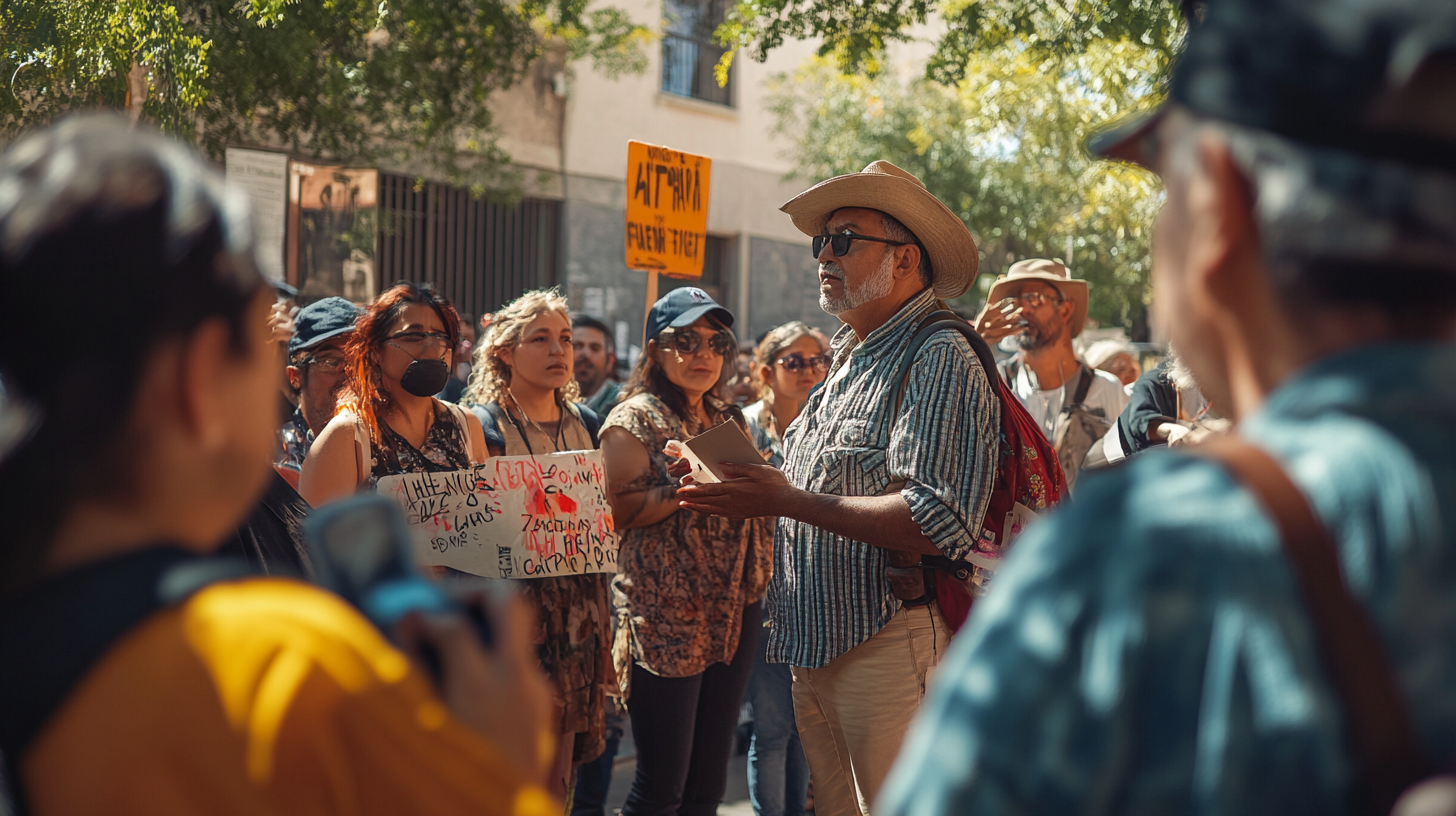Protestors Rally Against Congressman Gonzalez in Brownsville
On a brisk afternoon in Brownsville, local immigration advocates rallied outside the office of Congressman Vicente Gonzalez, voicing their strong opposition to his support for the Laken Riley Act. This legislation, which calls for the detention of undocumented migrants charged with minor offenses such as theft or burglary, has become a flashpoint in the Rio Grande Valley (RGV), raising critical questions about community values and immigration policies in South Texas.
Understanding the Laken Riley Act
Named after a Georgia college student tragically killed by an undocumented immigrant in 2024, the Laken Riley Act aims to tighten controls on undocumented individuals accused of petty crimes. It has already passed in the House and awaits Senate approval. Congressman Gonzalez, amidst backlash, defended his support by emphasizing the legislation’s intent to prevent avoidable tragedies and safeguard communities. “The death of Laken Riley was preventable,” Gonzalez stated. “This bill could have kept her alive.”
However, local leaders and advocates see it differently. “By supporting this bill, you have failed to stand with us,” said Joaquin Garcia, Director of Organizing for LUPE (La Unión del Pueblo Entero). “You have chosen to align with a dangerous narrative that threatens the rights and safety of so many people.”
The Valley’s Concerns: Local Impact and Community Tensions
The Rio Grande Valley, a border community with deep ties to immigration, faces unique challenges. The proposed legislation touches upon sensitive issues rooted in the Valley’s identity, potentially affecting relationships within immigrant communities and between citizens and law enforcement.
“This isn’t just an isolated policy issue. It impacts the fabric of our society here in the RGV,” said Dr. Elena Flores, a sociologist at the University of Texas Rio Grande Valley. “It’s not just about crime. It’s about trust, fear, and the potential chilling effect on immigrant cooperation with local authorities.”
Valley residents, known for their resilience and community spirit, are divided. Some see the legislation as necessary for maintaining public safety, while others view it as overly punitive and marginalizing.
Community Engagement and Advocacy
Saturday’s protest highlighted the community’s active engagement and advocacy efforts. Organized by local immigration groups, the protest drew a diverse crowd of students, families, and elders who marched with signs and chanted calls for justice and understanding.
Emma Hernandez, a local school teacher, brought her students to witness the demonstration. “I wanted them to see democracy in action. It’s important for the younger generation to engage with issues that shape our home,” she explained.
Local leaders continue to call for dialogue and education. “We need conversations grounded in empathy and facts, not driven by fear,” commented Rafael Soto, a community organizer with the RGV Coalition for Migrant Rights.
Associated Challenges: Immigration and Crime
Amid the debate, broader challenges of immigration and crime persist in the RGV. Incidents like a recent drunk driving arrest in Alton, where a motorist crashed into two homes, underline ongoing concerns over local crime. Meanwhile, Mercedes police reported a spike in graffiti, reflecting social tensions and public order issues.
“The multiple layers of issues are a reminder of the societal complexities we face,” noted Mercedes Police Chief Roberto Salinas. “It’s crucial for law enforcement and communities to work together in solving these.”
Future Implications for the Valley
As the Senate vote looms, repercussions of the Laken Riley Act, should it pass, might extend beyond legal frameworks. It could alter socio-political dynamics in Texas, redefining the state’s approach to immigration and crime prevention.
For the RGV, actively addressing these changes will be critical. Community forums, legal aid workshops, and educational initiatives are essential for navigating potential impacts. Local organizations are urging Valley residents to stay informed and engaged through resources like LUPE and the RGV Coalition for Migrant Rights, which offer support and information.
Balancing Perspectives: A Path Forward
To ensure balanced reporting, perspectives from law enforcement, policymakers, and community leaders alike must be considered. While public safety remains paramount, fostering trust with immigrant communities is equally vital for cohesive societal progression.
As Valley residents continue to grapple with these issues, the community’s commitment to inclusive dialogue and mutual understanding stands out. The path forward is undoubtedly challenging, but the region’s history of resilience and perseverance offers hope for meaningful resolutions.
In the coming months, all eyes in South Texas will be on how the Laken Riley Act, and subsequent immigration policies, unfold and affect the Valley’s intricate social tapestry. Amidst the complexity, one thing remains clear: Valley residents are committed to shaping their future with determination and unity.







